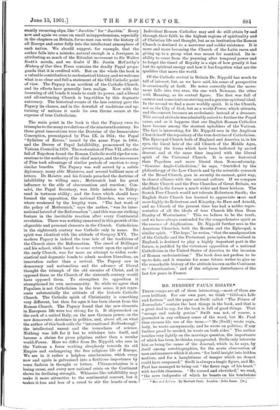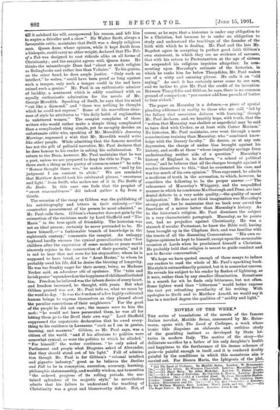MR. HERBERT PAUL'S ESSAYS.*
THESE essays are all of them interesting,—most of them ass even brilliant. For our own part, we think " Gibbon's Life and Letters " and the paper on Swift called " The Prince of Journalists" contain the best things in the book, and that is a great deal to say, for the book is full of good things. That "savage and unholy genius " Swift was not, of course, a journalist in any ordinary sense of the word, but Mr. Paul thus excuses his use of the term:—" He [Swift] wrote regu- larly, be wrote anonymously, and he wrote on politics ; if any further proof be needed, he wrote on both sides." The author touches very lightly on the marriage question, the importance of which has been, he thinks, exaggerated. Stella only interests him as being the cause of the Journal, which is, ho says, by- itself among autobiographies, for the acute observation of men and manners which it shows, " for lurid insight into hidden. motives, and for a haughtiness of temper which no despot could have surpassed." Swift is always a tragic figure, and Mr. Paul has managed to bring out " the fierce rage of his heart" with terrible clearness. " He nursed and cherished," we read, "the Balm inclignatio of which he boasts on his tombstone • Men and Letters. By Herbert Paul. London : John Lane. [Ss]
till it subdued his will, overpowered his reason, and left him to expire a driveller and a show." Sir Walter Scott, always a
favourable critic, maintains that Swift was a deeply religious man. Queen Anne, whose opinion, while it kept Swift from a bishopric, could carry no other weight, declared that The Tale of a Tab was designed to cast ridicule alike on all forms of Christianity; and the essayist agrees with Queen Anne. He thinks the misanthropic Dean had " about as much religion
as Bolingbroke and rather less than Voltaire." To his genius, on the other hand, he does ample justice. Only such an intellect," he writes, " could have been proof so long against such a temper, only such a temper could in the end have ruined such a genius." Mr. Paul is an enthusiastic admirer of lucidity, a sentiment which is oddly combined with an equally enthusiastic admiration for the novels of Mr. George Meredith. Speaking of Swift, he says that his mind "cut like a diamond," and "there was nothing he thought which he could not express." Some of his marvellous clear- ness of style he attributes to "his daily habit of explanation to unlettered women." The essayist complains of those writers who would rather make a simple thing complicated than a complicated thing simple, yet he savagely derides an
unfortunate critic who, speaking of Mr. Meredith's Amazing Marriage, expressed a wish that Mr. Meredith would write like other people. While admitting that the famous novelist
has not the gift of pellucid narrative, Mr. Paul declares that he does honour to his reader in asking his collaboration. To return to the Dean, however, Mr. Paul maintains that he was a poet, unless we are prepared to deny the title to Pope. "Is
there such a thing as the poetry of common-sense ? " he asks. 4‘ Horace thought there was," he makes answer, "and by his
judgment I am content to abide." We are reminded
that Matthew Arnold took his celebrated phrase, " sweetness and light:' from Swift, who makes use of it in The Battle of the Books. In this case one feels that the prophet of " sweet reasonableness " did indeed gather a fig from a thistle.
The occasion of the essay on Gibbon was the publishing of his autobiography and letters in their entirety,—" the counterfeit presentment of the person he most admired," as Mr. Paul calls them. Gibbon's character does not gain by the reinsertion of the excisions made by Lord Sheffield and " The Maria" in the true spirit of friendship. The historian was not an ideal person ; certainly he never pretended to be. He knew himself,—" a fashionable branch of knowledge in the eighteenth century," comments the essayist. An unhappy boyhood hardly excuses the cynical generalisation that "few children after the expiration of some months or years would sincerely rejoice in the resurrection of their parents," and it
is sad to hear that not even for his stepmother, whom be is supposed to have loved, or for " Aunt Hester," to whom he
probably owed his life, did he desire the blessing of longevity.
He was too frankly eager for their money, being, as Madame Necker said, an adorateur zele of opulence. The " trite and
lavish praise "squandered on the happiness of childhood irritated him. Freedom he believed was the inborn desire of every heart, and freedom increased, he tbought, with years. But what Gibbon praised was not, Mr. Paul tells us. what we mean by
the word to-day. It was the freedom of a few highly cultivated human beings to express themselves as they pleased about the peculiar convictions of their neighbours." For the good of the people he did not care; the masses were to him the mob : "he would not have persecuted them, he was all for
letting them go to the Devil their own way." Lord. Sheffield
suppressed the unpatriotic declaration that he owed every- thing to his residence in Lausanne, "such as .I am in genius, learning, and manners." Gibbon, as Mr. Paul says, was a citizen of the world, "and if his allusions to politics: were somewhat cynical, so were the politics to which he alluded." "For himself," the writer continues, "he only asked of Parliament and people what Diogenes asked of Alexander, that they should stand out of his light." Full of admira- tion though Mr. Paul is for Gibbon's " colossal intellect and gigantic industry," great as he believes the Decline and Fall to be in conception, execution, accuracy, learning, philosophic statesmanship, and worldly wisdom, not to mention " the ordered progress of its rolling periods, the sus- tained splendour of its majestic style," he' nevertheless admits that his failure to understand the. teaching of Christianity was a great and blameworthy defect. Not, of course, as he say-s, that a historian is under any obligation to be a Christian, but because he is under an obligation to
study and understand the teachings of the founder of the
faith with which he is dealing. Mr. Paul and the late Mr. Bagehot agree in accepting in perfect good faith Gibbon's
own statement, in which they see no evidence of sarcasm, that with his return to Protestantism at the age of sixteen he suspended his religious inquiries altogether. In com-
menting upon Macaulay's estimate of the historian, in
which he ranks him far below Thucydides, Mr. Paul makes use of a witty and amusing phrase. He calls it an "old
saying." As such it has certainly never come to our ears, and we incline to give Mr. Paul the credit of its invention- Between Thucydides and Gibbon, he says, there is no common ground of comparison: "you cannot add four pounds of butter to four o'clock."
The paper on Macaulay is a defence,—a piece of special pleading addressed in reality to those who are still "led by the fallacy that associates dulness with learning," though Mr. Paul declares, and, we heartily hope, with truth, that the "notion that Macaulay was shallow or superficial may be said to have died with Croker, or at least with Cotter Morison." No historian, Mr. Paul maintains, ever went through a more conscientious training than Macaulay, who " combined know- ledge with the literary faculty." He denies, or at any rate deprecates, the charge of undue bias brought against his history, and scoffs at those "whose impartiality springs from understanding neither side of a question." Macaulay's history of England is, he declares, " a school of political virtue," and he believes that all the charges brought against it resolve themselves to this, " that he overstated his case, and was too much of his own opinion." Thus expressed, he admits a modicum of truth in the accusation, to which, however, he considers the following to be the proper answer :—" The vehemence of Macaulay's Whiggery, and the unqualified manner in which he condemns Marlborough and Penn, are inci- dental defects in a very noble quality,—the quality of moral indignation." He does not think imagination was Macaulay's strong point, but he maintains that no book ever served the functions of a mirror better than Macaulay's history. As to the historian's religion, Mr. Paul dismisses the subject in a very characteristic paragraph. Macaulay, as he points out, had no prejudice against Christianity. He was a staunch if secular Protestant, he knew the Bible well, having been brought up in the Clapham Sect, and was familiar with the tenets of all the dissenting Communions. " His own re- ligious opinions he kept to himself, except upon the memorable occasion at Leeds when he proclaimed himself a Christian. He probably held that religion is meant to guide conduct and not to flavour conversation."
We hope we have quoted enough of these essays to induce our readers to read the whole of Mr. Paul's sparkling book. His style is extraordinarily pointed, but it is somewhat uneven. He reveals his subject to his reader by flashes of lightning, as it were, rather than by any steadier illumination. Sometimes in a search for wit he finds only bitterness, but not often. Some lighter word than " bitterness " would better express the tart yet refreshing peculiarity of his writing. With apologies to Swift and to Matthew Arnold, we would say it has in a marked degree the qualities of "acidity and light."











































 Previous page
Previous page